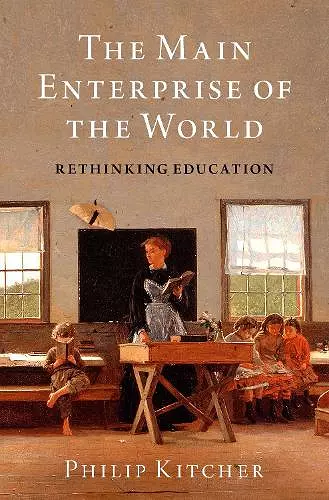The Main Enterprise of the World
Rethinking Education
Format:Hardback
Publisher:Oxford University Press Inc
Published:15th Feb '22
Should be back in stock very soon

Philip Kitcher's The Main Enterprise of the World offers a sweeping vision of the goals of education. Kitcher considers the ways in which schools and universities should advance their goals, explores the social changes required to make high-quality education available to all, and argues that these reforms are economically sustainable. Kitcher build his arguments from three broad goals of education as an institution: career development and professionalization, civic participation, and human fulfilment. He shows that shifts in the workplace provide opportunities to focus on the latter two goals, and to liberate education from supposed economic constraints. By tying education to the strengthening of both individual lives and the foundations of democracy, he offers a humanistic rethinking of what education should try to achieve. Drawing on figures like Dewey, Mill, Atkinson, and others who have written deeply on education, both in theory and in practice, Kitcher offers an extensive reconsideration of how we might change our educational institutions to respond not just to the twenty-first century economy, but to the deeper need for lifelong human flourishing. The Main Enterprise of the World renews classical Pragmatism: with one eye on the ideal, and the other on the world, it presents a picture of education appropriate for our century.
A towering achievement, worthy of a place beside the classic works of John Dewey, J. S. Mill, and Rabindranath Tagore. Kitcher's radical and compelling idea is that contemporary societies have been designing education to suit jobs that currently exist, when instead we should be imagining an education system that serves the needs of personal fulfillment and interactive democratic citizenship, and designing other social institutions to support those goals. This is ideal theory in the very best sense: a clear-eyed road map of a difficult destination, together with practical proposals for reaching it, articulated with both clarity and an inclusive love of human beings. * Martha C. Nussbaum, University of Chicago *
Philosophy of education, so vital and so neglected, receives a shot in the arm from Philip Kitcher's foundational, radical, and absolutely essential The Main Enterprise of the World. It also invigorates political theory, ethics, and wide range of other questions, as education—the building of a person—takes its place at the centre of human life. * Cheryl Misak, University of Toronto *
A remarkable achievement that will attract the attention of philosophers of all stripes, including but not limited to philosophers of education, as well as economists, psychologists, and other social scientists and policy experts. Arguing for a radical reconceptualization of both educational practice and its philosophical, economic, and social underpinnings, Kitcher's Deweyan vision insists that educational activities must aim at the improvement of both individual and collective lives, and reconceives educational ideals as tools of diagnosis and improvement rather than utopian goals to be imperfectly approximated. Kitcher defends that vision artfully and brilliantly. His call for serious educational experimentation, and the several proposed experiments, are important and potentially game changing. The Main Enterprise of the World is a masterful book. * Harvey Siegel, University of Miami *
ISBN: 9780190928971
Dimensions: 166mm x 238mm x 37mm
Weight: 726g
440 pages